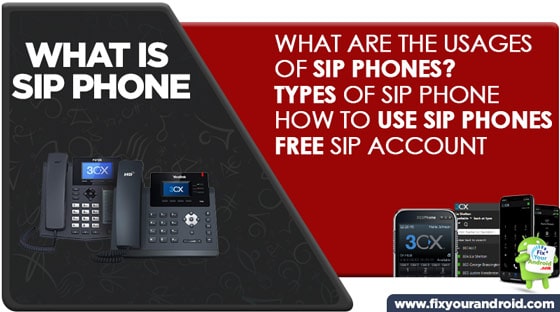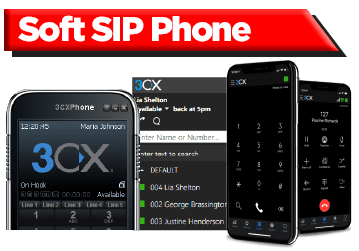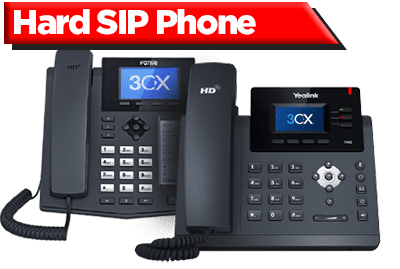SIP phones are used to place calls via VoIP or SIP trunks. There are two types of SIP phones, soft SIP phones and hard SIP phones. Know All about SIP phones and SIP calling.
What is SIP Phone?
SIP phones are used to place calls using a VoIP account or SIP( Session Initiation Protocol) trunk. A SIP phone uses the internet protocol to transfer analog calls over VoIP.
In other words, SIP Phone is a standard phone that uses SIP to set up and manage calls. It can handle multiple call channels at once. The marketing companies are well popular for using SIP phones to contact the customers for product promotion.
Typical SIP calls are placed using these phone by using VoIP or SIP account. There are two types of SIP phones.
Two types of SIP phone
1. Soft SIP Phone
Any mobile phone configured to make SIP calls are called a Soft SIP phone. Any mobile device that can be configured with SIP server and SIP account can be called a SIP softphone. It could be a laptop running on Windows/Mac or a Smartphone running on Android or iOS.
In short, any device that has a microphone and a speaker to perform the calling tasks can be turned into a soft SIP phone.
Read Also: 10 Best Android Apps for Free VoIP Calls
1. Hard SIP Phone
A Hard SIP phone is connected to the internet through a LAN cable or Wifi network. All the calls made by Hard SIP Phones are regulated by preconfigured SIP account.
These phones are similar looking to typical landlines but with network-integrated hardware components. These phones are connected to the internet via a cable or wireless internet spot.
these devices take another industry-standard cordless technology called DECT, so that the phones communicate with a base station using the DECT protocol, while the base station communicates with an IP-PBX using SIP and RTP as their transport protocols.
Usage of SIP Phone
A SIP phone is used to perform several call-related tasks which are not possible to achieve with modern smartphones like making outgoing calls, managing multiple calls at once, forward calls to another channel etc.
Business providers are shifting to SIP calls rapidly in an effort to provide the staff a better tool for managing the calls.
Other Features of SIP Phone:
- Basic and advanced call forwarding
- Hold with optional music
- Conference calling
- HD phone calls
- Auto-attendant
- Call recording
- Shared call appearance
- Custom caller ID
- Mobile and desktop app integration
Benefits of SIP Phones
Unlike regular phones fix/mobile, SIP phones are more effective to manage calls. The calls made using SIP cloud server are way cheaper than the regular cellular phone.
Other benefits of these phones are that they are fully customizable. All the features required can be added using a simple software application that allows you to use in-call features effectively beyond the limits.
Other Benefits of SIP Phone
- No requirements of traditional copper-lined telephone connection
- Almos zero maintenance or configuration required
- Connect local and remote staffs together
- Fully encrypted calls
- Block incoming calls
- A cloud-based management system allows you to access the SIP calls anywhere.
- Add features using software
- Fully customized user interface as per requirement.
This was a short introduction to SIP phones, their benefits and usage. But do you know what the term SIP exactly means and how to set up a SIP for your business? Let’s find out in the next section below.
What is SIP?
SIP(Session Initiation Protocol) is basically a communication protocol management system to manage multimedia communications like voice and video calls.
It enables the business or organizations to maintain a unified communication system for their staff by integrating email, calls, instant messaging and other basic phone-related tasks. Organizations will use a SIP phone if they’re looking for scalability, reliability and not being limited only to voice calls. With SIP, you can expand into video and instant messaging.
How SIP Calling Works
SIP calls are managed and performed by special SIP cell phones either softphones or hard phones. These phones are quite identical in function but vary in the availability and usages of the services.
When a call is made through a SIP phone, the calls are sent over SIP networks(internet protocol) and a device notifies the SIP server it’s connected to. Later the SIP server initiates contact with another extension or patches the call over to the Public Switched Telephone Network AKA PSTN.
The call is established once the other party answers the phone.
SIP vs VoIP Calls What’s the difference?
The basic difference between VoIP calls and SIP calls is the features and scalability. VoIP is a one-on-one communion protocol while the SIP calls are two-way communication.
A SIP phone is specially designed or configured by a software application to perform certain communication tasks. While VoIP calls can be made by any other smartphone using a VoIP app.
SIP calls are fully customizable and can be configured and add features like email, video calls, calls management system etc. While VoIP calls are fully dependent on the VoIP service provider and the application used to make VoIP calls.
VoIP calls are usually limited to a few number people and often used for meetings or video conferencing. While SIP calls are suitable for managing the comminution at a larger scale.
Who Usages SIP phones?
SIP phones are highly used by corporations and businesses to manage a uniform communications system to manage and access email, calls, text messaging, and other services.
This was the short into to SIP calling and SIP phones, we also discussed the functions and benefits of SIP calling. Don’t forget to visit about section to explore more about the technology and stuff.
READ ALSO:



